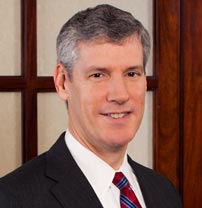March 2, 2015

How T. Mills Fleming gave the Lucas a sequel
By Amy Kates, as published in Super Lawyers Magazine / Georgia 2015
When you’re sick, you call a doctor. When a hospital is sick, it calls T. Mills Fleming. Fleming, of HunterMaclean in Savannah, represents health care systems, but his subspecialty is helping hospitals get off life support. “I call them distressed hospitals,” Fleming says. “Hospitals that are in very difficult financial, operational, managerial or governance straits, where, for whatever reason, if things don’t get fixed, the hospital is going to go bankrupt or be closed down, or be subject to merger or sell off. That’s where I come in.
“And I cut my teeth on the Lucas Theatre.”
The Lucas Theatre opened in 1921, the era of opulent movie palaces, and was built by Fleming’s great-grandfather, Arthur Lucas. For the design, Lucas and architect C.K. Howell combined Greek revival, art deco and neoclassical styles.
“He was a big man, a big personality, with a can-do attitude,” Fleming says. “He had a deep love for the community, his family and just everything that he did.”
Despite completing only the third grade, he also had a head for business. By the time he died in 1943, he owned 40 theaters across the Southeast. “Of all the theaters that he owned and built,” Fleming says of the Lucas, “it was the only one he put his name on…. If you had to build the Lucas Theatre today, it would be a $50 million project, easy.”
The theater closed in 1976, a result of a population shift to the suburbs. The last straw for its owners was a deserted film screening. The movie? “The Exorcist, believe it or not,” Fleming says, with a Laugh. After a string of unsuccessful attempts to turn the theater into a comedy club, the building was slated for demolition. End credits. Except in 1986 a group of citizens founded a private group, Lucas Theatre for the Arts, to save it. Funds were raised, but then the money dried up.
“There were allegations money had been misspent, which was not true, but this thing was an ogre of a project—the dog of all dog projects—and there was no way it was going to survive,” Fleming says.
Someone needed to lead the charge.
“I’d only been in Savannah five years. People were going, ‘Who is this lawyer guy? He’s nuts!” Fleming remembers. They thought he was even crazier when, not long after being named the theater’s board chairman, he cold-called a man who had hosted a party for the Lucas earlier that year.
“I call and say, ‘I understand that you’re upset about the Lucas; let’s have a conversation.’ He chewed me out for an hour. And I said, ‘Well, I will make a promise to you. I promise that I will call you every week and tell you exactly what we are doing and have done and will do, and I will not spend a dollar we don’t have.”
Within nine months, Fleming and the board raised $3 million. “And that gentleman called me up and we went to lunch and he had an envelope for me,” he says. “It was a check for half a million dollars. Why? Because he said I did what I told him I would do.”
Fast-forward to 1996, when Clint Eastwood’s Midnight in the Garden of Good and Evil was filming in Savannah. Fleming put out feelers to the stars for a tour of the Lucas, and Kevin Spacey accepted.
“Kevin, in his heart of hearts, is a theater actor,” Fleming says. “We were under construction at the time Kevin toured, so he literally crawled through every nook and cranny. And he got on the stage and said, ‘I could perform here and not wear a microphone.’ And I said, ‘So?’ And he said, ‘You don’t understand. The acoustics in here are perfect. That doesn’t happen.”‘
Spacey was impressed to the tune of a $200,000 donation. Eastwood threw in $50,000, and the Garden wrap party was at the Lucas, right in the midst of renovations, with tickets at $100 a pop to benefit the cause.
Today, the Lucas runs a full schedule that includes concerts, ballets, opera and classic films, including, recently, To Kill a Mockingbird.
“It’s a community asset, but it’s also a top-drawer, A-plus, Broadway-level theater,” Fleming says. “Having this experience in your community takes you and puts you on a higher plane. You see what beauty and art do. It makes life better.”




